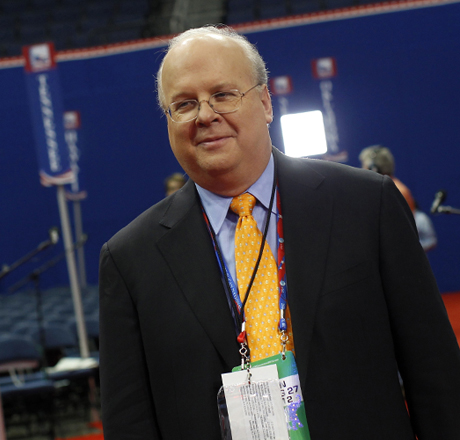Karl Rove is back as GOP party boss, but this time it’s clear that even the best-laid plans of the savviest political strategists often go awry.
That became obvious earlier this week, on Sept. 25, when Missouri senatorial candidate Todd Akin reaffirmed that he was staying in the race in defiance of Rove, who had demanded Akin’s withdrawal and yanked American Crossroads’ millions from his campaign after Akin touted the prophylactic character of “legitimate rape.”
When pulling the super PAC dough didn’t faze the stubborn Missouri Tea Partyer, Rove went ballistic. “We should sink Todd Akin,” he declared, according to Bloomberg Businessweek. “If he’s found mysteriously murdered, don’t look for my whereabouts!”
Rove’s remarks did more than just reopen the schism between the GOP establishment he embodies and the Tea Party, which has begun to see him as a ruthless party boss. It also showed that the Republicans have another serious problem in addition to Mitt Romney’s disastrous candidacy: Karl Christian Rove.
Rove’s comment about Akin was not the first time this campaign that he linked himself to murder. At the Republican convention in Tampa, in response to a question I asked him at a CSPAN-televised event, Rove falsely asserted that my new book, “Boss Rove: Inside Karl Rove’s Secret Kingdom of Power,” accused him of being a murderer — an apparent reference to the 2008 death of his computer guru, Mike Connell. Again, the “murder” comment was off point and completely unnecessary.
Let’s get this straight: Out of the blue, this highly disciplined, message-centric Machiavellian strategist has completely unnecessarily associated himself with murder. Twice. What is Karl Rove smoking?
If the Svengali-like party boss behind Romney has fallen to such depths, it should come as no surprise that the candidate himself has performed so poorly. For starters, Rove hasn’t had the close personal relationship with Romney he had with Bush and has had to project his influence via surrogates in Romney’s high command, specifically, former RNC Chairman Ed Gillespie, the co-founder with Rove of American Crossroads, who is now a high-level Romney strategist; Beth Myers, a former Rove protégé who served as Romney’s chief of staff and oversaw the selection process of the vice-presidential nominee; Carl Forti, the political director of American Crossroads who helped start Romney’s PAC, Restore Our Future; and media strategist Stuart Stevens, a Bush/Rove veteran; and others.
After the Republican convention in Tampa, however, Rove’s shadow operation fell prey to bitter infighting, with Stevens taking the heat for the Clint Eastwood fiasco and for Romney’s failure to mention Afghanistan in his speech.
For Rove, who was brilliant at keeping George W. Bush on message, working via remote control with Romney has been a disaster. The theme of the Republican National Convention — “We Built It” — is already a distant memory, even though untold millions in prime-time ad dollars were poured into it just a month ago. Meanwhile, Romney has unwittingly replaced it with his own self-destructive narrative that dismisses 47 percent of the American people as dependent victims and reinforces the notion that he is a multimillionaire who doesn’t give a whit about most Americans.
Of course, to pundits who saw Rove as a creature of the Bush dynasty, it is a surprise that he is back in the game at all. Nearly indicted in the Valerie Plame affair, Rove saw his patron exit the White House with the lowest approval ratings of any president in history. Then, in 2008, Rove, who sees himself as a historic figure presiding over an enduring realignment of the American electorate, watched his dreams of a permanent Republican majority vanish in a Democratic sweep of the House, the Senate and the White House.
But the Democrats failed to drive a stake through Rove’s heart. As I recount in “Boss Rove,” after the Supreme Court’s Citizen United decision in 2010, Rove co-founded American Crossroads and its sister group, Crossroads GPS, to become king of the super PACs. He then used his position at Fox News and the Wall Street Journal to take potshots at Romney’s GOP rivals. All of which left Boss Rove sitting in the catbird seat overseeing as much as a billion dollars in super PAC funding to be spent in the general election.
But now it is questionable as to whether even that vast sum can repair the damage wrought by Romney’s candidacy. If Rove decides Romney is a lost cause, he can divert huge sums to key Senate races — and in large measure he has already begun to do that. But abandoning Romney completely will hurt down-ballot GOP candidates nationwide.
Of course, money is not the only weapon in Rove’s arsenal. Remember the smears against John McCain in the 2000 primaries claiming that he’d fathered a child with an African-American prostitute? Or the Swift Boat Veterans for Truth whose falsehoods destroyed John Kerry? Push polls that spread rumors that Democratic candidates were lesbians or pedophiles? “Caging” tactics that challenged the voter registrations of African-American voters in Ohio in 2004?
They were all dazzlingly effective strikes that were strategically timed and placed to take down the enemy — with no fingerprints. It just happened that, again and again, they benefited Karl Rove’s candidate.
This time, voter suppression may be Rove’s most powerful gambit. For nearly a decade, he has promoted voter ID laws, and in November at least 23 states will be impacted by GOP attempts to suppress the vote. According to the Brennan Center for Justice at New York University School of Law, more than 5 million voters may be affected.
Meanwhile, whatever the outcome of the election, Karl Rove is playing the long game. He’s vying for complete control of the party. He still has his hands on the super PAC purse strings — and that money means he runs the Republican Party. Even if Romney loses, he will still be in control. It’s just that he may be thinking about 2016 a bit earlier than he had planned.

